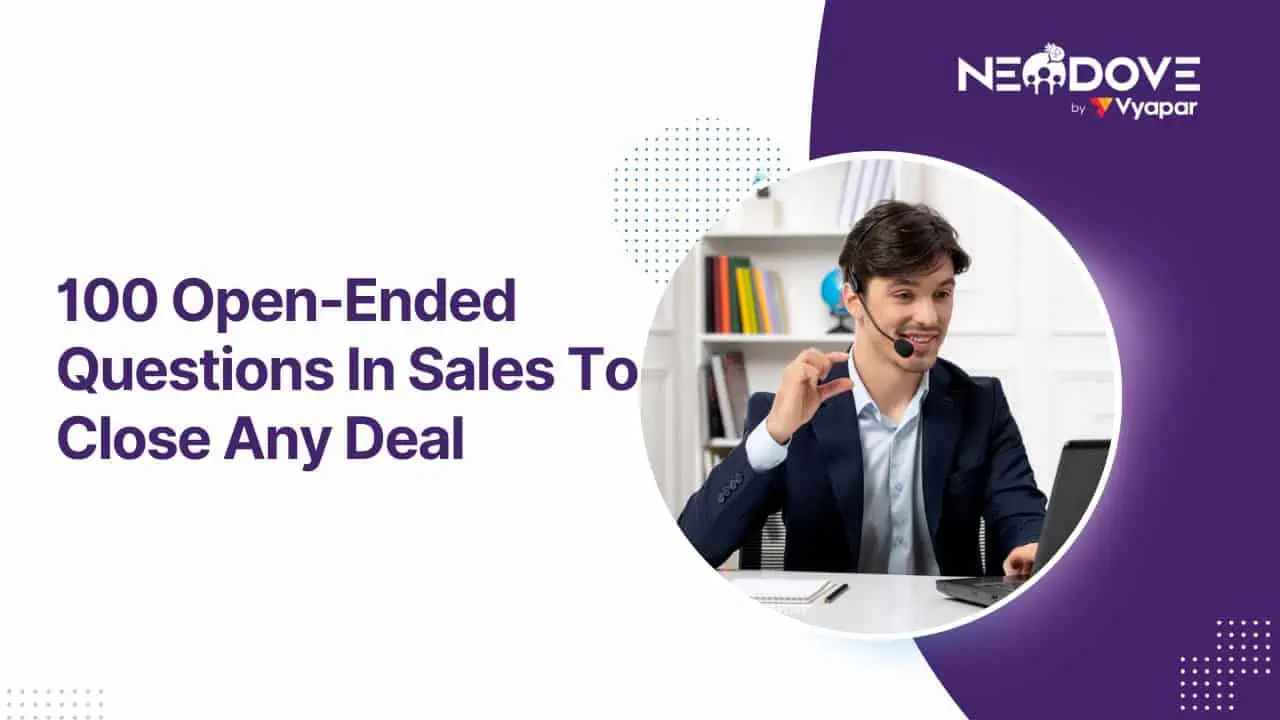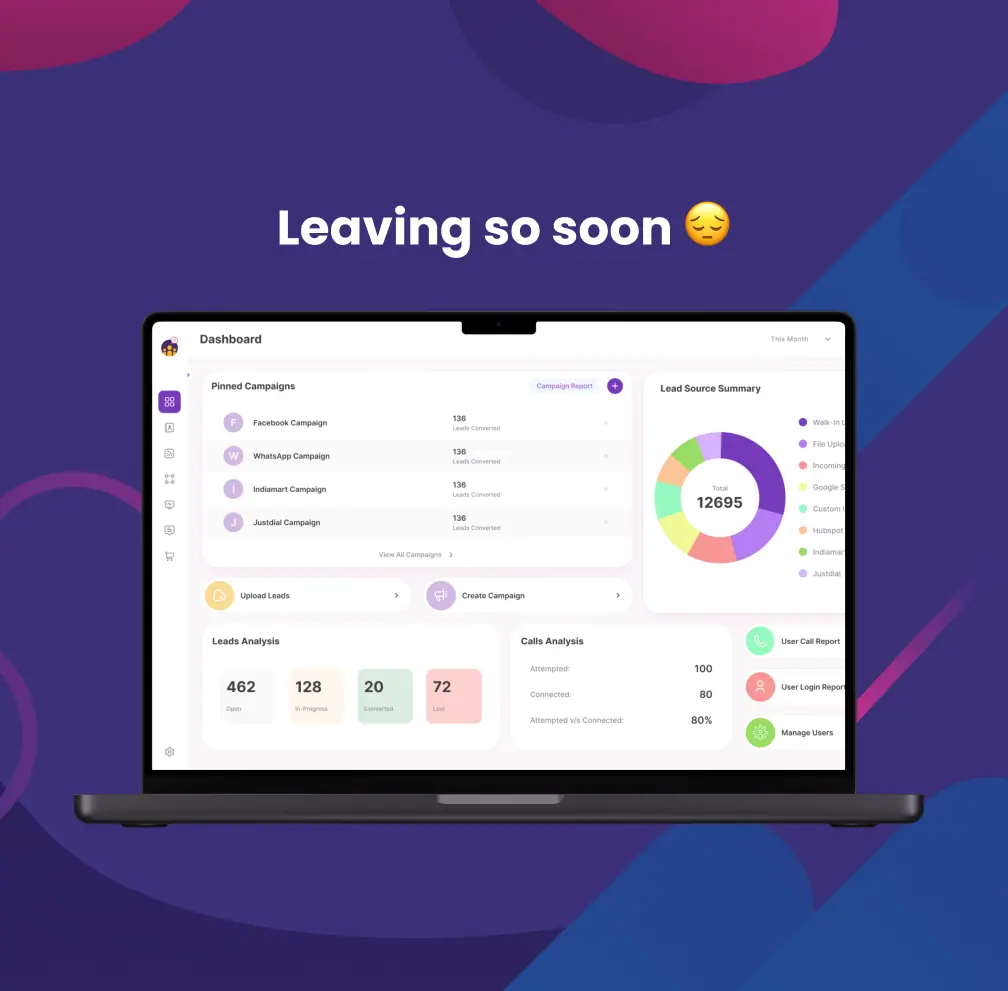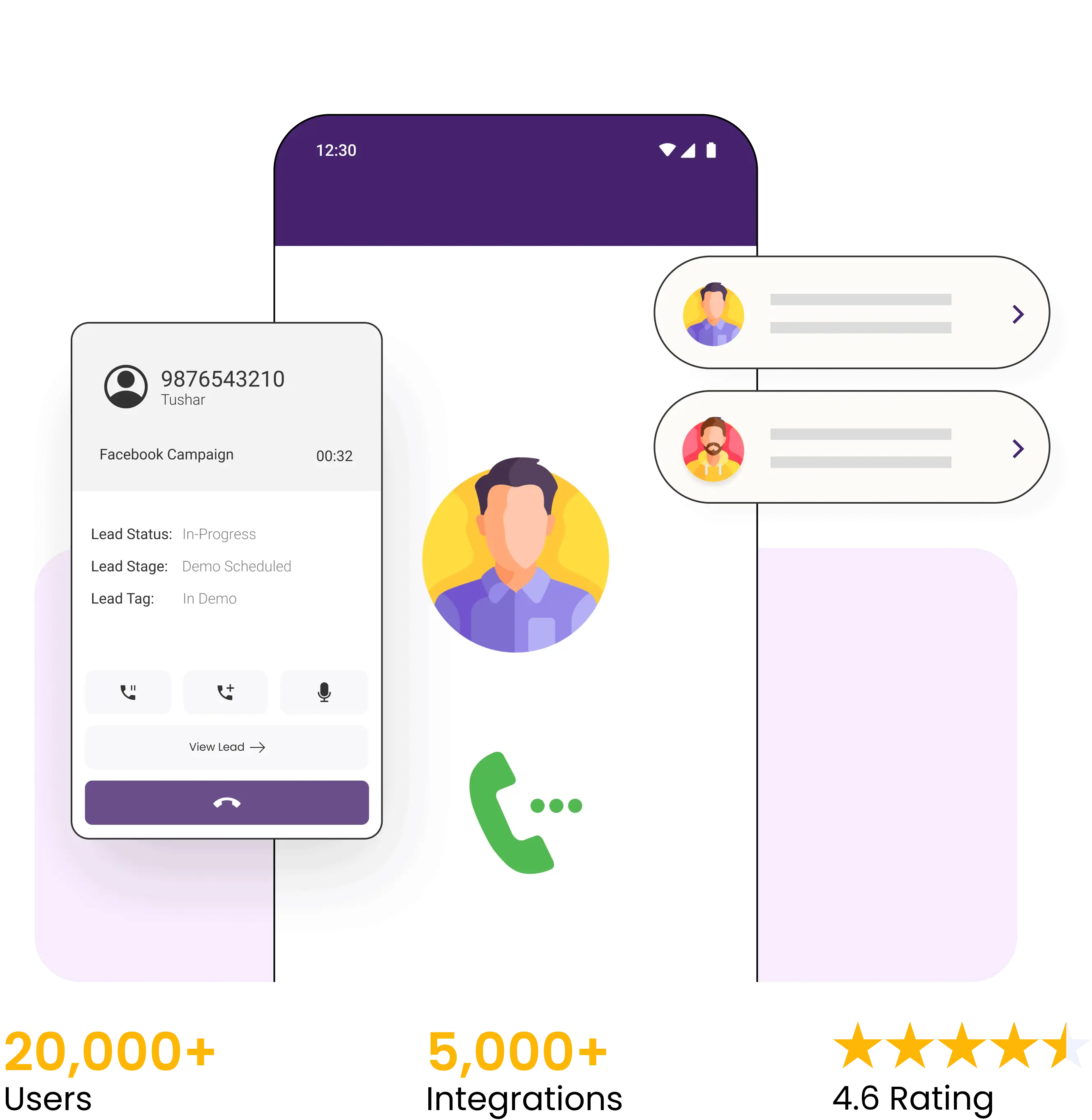FREE GUIDE
Get your copy of the ultimate guide to lead generation through telecalling (scripts included)

Table of Contents
ToggleKey Takeaways:
Closing a deal is the ultimate dream for any salesperson – we know it’s yours too. But it requires more than just a great product – it demands a strategic approach and the ability to truly understand your customers. One powerful tool? Asking open-ended questions in sales conversations.
These open-ended questions encourage customers to share their thoughts, concerns, and motivations freely. They provide valuable insights that allow you to tailor your pitch, address objections, and position your offering as the perfect solution. Want to master this art?
And that’s the reason we have compiled 100 open-ended questions to ask customers in sales. From uncovering pain points to understanding decision-making processes, these sales open-ended questions will help you build rapport, engage in meaningful dialogue, and ultimately, close more deals.

You should always keep in mind that not all open-ended questions are created equal, and it takes practice and expertise to formulate questions that truly engage customers and uncover their needs.
To help you win your sales game, here’s a list of expert tips to ask better open-ended questions for sales. These tips will guide you in composing questions that not only encourage conversation but also demonstrate your expertise and commitment to understanding your customer’s unique needs.
Before you can ask effective open-ended questions in sales, you need to be an expert in active listening skills. Pay close attention to your customer’s responses, body language, and tone, and use this information to draft follow-up open-ended questions to ask customers in sales that get deeper into their concerns and motivations.
Important Tip: Truly hear what the customer is saying, not just the words but the underlying meaning.
Sales open-ended questions should be neutral and unbiased, allowing the customer to share their perspective freely. Avoid leading questions that could influence or manipulate their responses.
Important Tip: Frame questions impartially to gather authentic insights from the customer’s perspective.
Every customer is unique, and so should be your open-ended questions for sales. Adapt your questions based on the customer’s industry, role, and specific situation to demonstrate your understanding and expertise.
Important Tip: Customize your open-ended questions to resonate with each customer’s unique context and challenges.
Open-ended questions that encourage customers to share real-life examples and stories can provide valuable insights into their challenges and needs. Ask questions that prompt them to describe their experiences in detail.
Important Tip: Tell stories about the experiences of your previous customers – show the new customers how you added value to their lives.
Successful salespeople never stop learning about their customers. Maintain a genuine curiosity and ask follow-up sales open-ended questions to explore new information or clarify any uncertainties.
Important Tip: As Steve Jobs says “Stay hungry, stay foolish” We would advise – “Stay hungry, stay curious”.
While open-ended questions are excellent for gathering information, don’t forget to bridge the conversation towards potential solutions. Use the insights you’ve gained to demonstrate how your product or service can address their specific needs.
Important Tip: Seamlessly transition from gathering information to positioning your offering as the ideal solution.

Here comes the main part – the one you have been waiting for. 100 open-ended questions to ask customers in sales – to improve your chances of closing the deal. We will not waste much of your time and let’s jump right into the questions:
These are designed to identify the client’s specific needs and challenges, enabling tailored solutions through sales open-ended questions.
1) Can you walk me through your current process for [specific task/area]? What are the biggest bottlenecks or inefficiencies?
2) What are the main goals or objectives you’re trying to accomplish with a [product/service] solution?
3) If you could identify the perfect solution, what would it ideally do for your business?
4) What are the must-have features or requirements for a new [product/service] to meet your needs?
5) Can you share some examples of challenges or pain points your team currently faces?
6) How are those challenges impacting your productivity, costs, or overall business performance?
7) What’s preventing you from [achieving a specific goal] more effectively with your current approach?
8) How do you measure success in [relevant area]? What metrics are most important?
9) What are your top priorities when evaluating potential [product/service] solutions?
10) If budget wasn’t a factor, what would be your ideal way to solve [specific pain point]?
These questions aim to understand the client’s past experiences with similar products or services, leveraging open-ended questions for sales to enhance product alignment.
1) Can you share your experience with using [similar product/service] in the past? What worked well and what didn’t?
2) What were the key factors that led you to choose your current [product/service] solution?
3) How has your experience been with implementing and using your existing [product/service]?
4) What have been the biggest challenges or pain points you’ve faced with your current approach?
5) If you could change one thing about your previous [product/service], what would it be?
6) How satisfied are you with the level of support or training provided by your current vendor?
7) Can you give an example of a time when your previous [product/service] exceeded your expectations?
8) What features or capabilities are missing from your existing solution that would be ideal to have?
9) How does your current [product/service] compare to alternatives you’ve used or considered in the past?
10) Based on your experiences, what advice would you give others looking to invest in a new [product/service] solution?
These open-ended questions in sales help to clarify what the client hopes to achieve, to align expectations with deliverables.
1) What are your primary goals or desired outcomes for investing in a new [product/service] solution?
2) Can you describe what success would look like for your organisation in [X] months after implementation?
3) What are the key performance indicators or metrics you’ll use to measure the success of this initiative?
4) How will achieving those goals impact your bottom line, efficiency, or competitive advantage?
5) What are your expectations around implementation timelines or rollout phases?
6) Ideally, what kind of support or training would you need from the vendor during and after implementation?
7) Are there any specific integration requirements with existing systems or tools that are essential?
8) How important is scalability or future growth potential when evaluating potential solutions?
9) What’s your vision for how this solution could evolve or expand its capabilities long-term?
10) If this solution exceeds all expectations, what would be the next area you’d want to optimise?




These questions will encourage the client to share their views on industry trends, Utilising open-ended questions for sales to gauge their market awareness and adapt the sales pitch.
1) How would you describe the current landscape and major trends in your industry?
2) What emerging technologies or innovations are you most excited about in your field?
3) From your perspective, what are the biggest challenges or disruptive forces impacting the industry?
4) How do you see consumer/customer behaviours and expectations evolving in the next few years?
5) What role do you see [specific trend] playing in shaping the future of your business?
6) Are there any regulatory changes or compliance issues on the horizon that concern you?
7) Which companies or competitors do you look to as innovation leaders in this space?
8) How does your organisation stay ahead of industry changes and prepare for future demands?
9) What are your thoughts on the increasing importance of [trend] and its impact on your operations?
10) If you could predict one major industry shift in the next 5 years, what would it be?
Focuses on understanding the client’s future goals and how your offering might fit, through strategic sales open-ended questions.
1) Can you share your long-term vision or growth plans for the business over the next 3-5 years?
2) What are some of the key initiatives or strategic priorities you’re focusing on to achieve those goals?
3) As you look ahead, what emerging trends or market shifts do you anticipate impacting your industry?
4) How do you see customer needs or demands evolving in the foreseeable future?
5) What role might new technologies play in helping you stay competitive and meet changing requirements?
6) Are there any capabilities or resources you’re currently lacking to fuel future growth plans?
7) How does improving [specific pain point] fit into your organisation’s bigger strategic roadmap?
8) What would be the ideal outcome or end-state you’re working towards in [key area]?
9) If our solution could deliver [X benefit], how might that impact your ability to reach future targets?
10) Looking 3 years ahead, what’s one area you hope will be completely transformed or optimised?
Aids in determining the client’s priorities regarding features or services, crucial for effective targeting with open-ended questions for sales.
1) If you had to prioritise, which capabilities or features are must-haves versus nice-to-haves?
2) What are the top 3 areas or pain points you need to solve for most urgently?
3) How would you rank the importance of [list of key features] for your specific needs?
4) From your perspective, what’s more critical – [feature A] or [feature B]? Why?
5) Are there any deal-breaker requirements that a solution absolutely needs to meet?
6) How does the priority of [specific need] compare to other initiatives you’re juggling?
7) What’s the biggest opportunity cost or risk if you didn’t address [key problem] effectively?
8) When evaluating solutions, how much weight do you place on [factor] compared to [factor]?
9) If you could only choose 2-3 areas to invest in maximising over the next year, what would they be?
10) If budget/cost weren’t an issue, where would you double down or prioritise investment?
Seeks to understand the company’s culture and decision-making, enabling better relationship building through sales open-ended questions.
1) Can you describe the core values or principles that guide decision-making at your company?
2) What role does [job title] typically play in evaluating and selecting new solutions?
3) How would you characterize your organization’s appetite for risk or trying new approaches?
4) What are the key criteria or requirements that must be met for getting buy-in on major initiatives?
5) Who are the critical stakeholders involved in the decision process for [product/service] investments?
6) How does your team/company prefer to work with vendors – hands-on collaboration or more hands-off?
7) What level of ongoing support, training or professional services do you typically require?
8) How important is reputation, industry experience or past client success when evaluating potential partners?
9) Can you share an example of a vendor relationship that went really well and what made it successful?
10) What logistical factors like implementation timelines or integration requirements are priorities?
Identifies recent challenges faced by the client that your product/service could solve, employing open-ended questions for sales to position your solution.
1) Can you walk me through a specific situation or problem your team has been grappling with lately?
2) What has been the biggest impact or pain point caused by that challenge?
3) What approaches or solutions have you already tried to resolve this issue?
4) What gaps or shortcomings existed in those previous solutions?
5) If you were to design the ideal solution, what key capabilities would it need to have?
6) How is this problem impacting other areas of your operations or goals?
7) What would be the main benefits if you could finally put this problem behind you?
8) Who else is impacted or has a vested interest in solving this challenge?
9) How have you been measuring or quantifying the effects of this issue?
10) What’s preventing you from addressing this problem more effectively on your own?
Gauges what the client would consider a successful outcome, crucial for service delivery alignment using sales open-ended questions.
1) How would you define or measure a successful implementation of this solution?
2) What are the key milestones or checkpoints along the way that are important to hit?
3) Six months after going live, what would a “win” look like for your organization?
4) What are the must-have deliverables or end results you’re expecting from this investment?
5) How will you be evaluating the ROI or payback on this project over time?
6) What kinds of reporting, metrics or visibility into performance do you need?
7) Who are the key user groups that need to be satisfied for this to be considered a success?
8) Are there any scenario planning or risk mitigation factors we should incorporate?
9) What does optimal ongoing support or continued service look like post-implementation?
10) If we could exceed your expectations, what might a “home run” outcome entai
Focuses on creating a friendly, trusting relationship with the client. Sales open-ended questions here are designed to encourage clients to share information about their personal experiences, interests, and business culture.
1) What first sparked your interest in this industry or field?
2) Can you tell me a little bit about your career journey and how you ended up in your current role?
3) Outside of work, what are some of your favourite hobbies or activities?
4) Are there any business books, podcasts, or thought leaders you’ve found particularly inspiring lately?
5) How would you describe the company culture and working environment here?
6) What is your team’s philosophy or approach when it comes to [core job function]?
7) I’m curious to learn more about your background – where did you grow up?
8) Can you share a recent success story or accomplishment you’re really proud of?
9) If you could plan an ideal team-building event, what would it look like?
10) What’s something people might be surprised to learn about you or your interests outside of work?

We have covered what to ask, but isn’t it hard to know what not to ask? While open-ended questions can facilitate engaging conversations and insights, certain types of questions should be avoided when dealing with customers in sales or any service-oriented interactions. Here are some categories of questions you should generally steer clear of:
Questions that pry too deeply into personal matters not relevant to the transaction can make customers uncomfortable and appear unprofessional.
Asking customers to answer complicated questions that require technical knowledge or detailed recall can be frustrating and lead to disengagement.
While not inherently bad, these can halt the flow of conversation and limit the information exchanged, making them less effective in understanding deeper customer needs.
It’s important to keep hypothetical questions relevant to the customer’s context. Avoid scenarios that are far-fetched or not aligned with their current or future needs.
These suggest a specific answer and can come across as manipulative. They might also discourage honest feedback, which is crucial for effective service.
Questions that begin with negative premises may set a pessimistic tone for the conversation, potentially affecting the customer’s mood and perception of the interaction.

In the end, mastering open-ended questions in sales conversations is essential for finding deeper insights into customer needs and motivations. By actively listening, avoiding manipulative or overly complex queries, and tailoring questions to the unique circumstances of each customer, sales professionals can build stronger relationships and position their products or services effectively.
The ability to engage customers through thoughtful inquiry not only enhances the sales process but also increases the likelihood of closing deals successfully.


Book a free demo and see how you can close more deals, faster!



95% business who use NeoDove report 3x more profits!
Happy Customers
107k reviews

These outcomes and beyond can be yours.
Lead Leakage
Increase in call attempts
More Engagement



4.6 Rating
FREE GUIDE
Get your copy of the ultimate guide to lead generation through telecalling (scripts included)